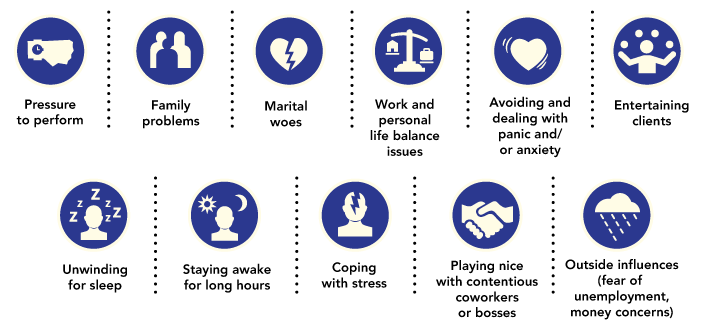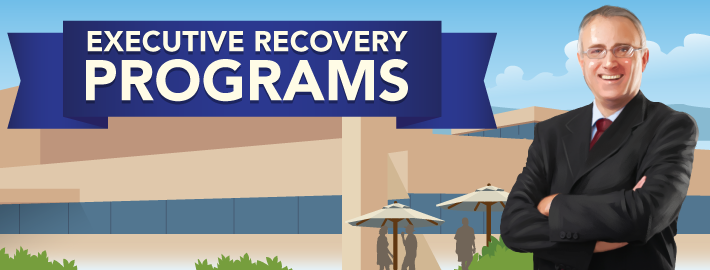To cope, some may turn to stimulants, like cocaine or adderall to inspire the gusto to put in extra hours to impress their boss or get that next promotion. Or, they may turn to alcohol at night after a long day at work as a way to relax, unwind, or even to help them go to sleep.
The Recovery Needs of Executives
The needs of executives facing drug and alcohol treatment and recovery are different than those in many other groups that come to treatment facilities. Many executives face work challenges and pressures that cannot be put on hold in order to facilitate recovery. In many cases, even acknowledging the need for treatment publicly could jeopardize a career you’ve worked so hard to build. That’s just one of the reasons why executive recovery programs are different than other types of treatment programs available to people trying to overcome addictions. Most executives put off rehabilitation because there are so many fears associated with addiction and recovery. Effective executive recovery programs alleviate these fears so you can focus instead on the bright future ahead of you. By entering into rehabilitation and recovery programs specifically designed for executives, you’re taking the first step for a future without fear, in which you’re already on the path for all the following things and more.
Effective executive recovery programs alleviate these fears so you can focus instead on the bright future ahead of you. By entering into rehabilitation and recovery programs specifically designed for executives, you’re taking the first step for a future without fear, in which you’re already on the path for all the following things and more.

Executive Drug and Alcohol Rehab Defined
Executive drug and alcohol rehabilitation is a unique system of recovery specifically designed for busy professionals. There are many concessions made in this form of recovery with the understanding that the same characteristics that helped you succeed in your career will also help you succeed in recovery, but only if you’re able to do so without worry over the status of your career. For most executives in today’s always connected society, this means that you must be available to work at least part of the average workday. While you cannot put in a full 8-hour day, much less the 10, 12, or 14-hour days you’re accustomed to, while in a residential recovery program for executives, you will be able to stay connected and have access to phone and email communication when necessary. This treatment is available for a wide range of dependencies including those to:- Prescription Drugs
- Alcohol
- Marijuana
- OxyContin
- Heroin
- Cocaine
- Vicodin
- And more.
 The duration of treatment varies from one program to the next and according to the severity of your addiction. The longer you’re able to remain in a residential facility for treatment, the greater your odds are for successful long-term recovery.
Executives do have the option of pursuing outpatient recovery. These are less intrusive options that are not as effective as residential programs, though getting help is essential. If you cannot take the time to enter into a residential executive rehab program, you’ll find the same degree of discretion and confidentiality available with outpatient treatment options.
The duration of treatment varies from one program to the next and according to the severity of your addiction. The longer you’re able to remain in a residential facility for treatment, the greater your odds are for successful long-term recovery.
Executives do have the option of pursuing outpatient recovery. These are less intrusive options that are not as effective as residential programs, though getting help is essential. If you cannot take the time to enter into a residential executive rehab program, you’ll find the same degree of discretion and confidentiality available with outpatient treatment options.
What Makes Executive Recovery Programs Unique?
Confidentiality and discretion are cornerstones of all recovery programs, including executive recovery programs. You need to focus as much of your attention as possible on your recovery without worry that your recovery status may somehow become public knowledge. Executive rehab and recovery programs, while acknowledging the fact that your primary focus needs to be involved in recovery efforts, take into consideration your need to protect your job and your career. In addition, these programs are designed based upon the understanding that you’ve become accustomed to certain standards of living that aren’t available in traditional rehab facilities. With that in mind there are a few features that are fairly unique to executive rehab facilities and programs.
Amenities
Certain lifestyle amenities you’ve become accustomed to are available to you during recovery. While there are differences from one facility to the next, some of these amenities include things like fitness centers, racquetball courts, saunas, driving ranges, massage therapists, yoga, and more. While this is not a vacation, the amenities at many executive rehab facilities have been compared to those at a five-star resort. The idea is that healing works best when it involves the mind, the body, and the spirit. Most executive programs work to provide peace of mind, creature comforts, and more to aid in the healing process. The goal, of course, is to keep you focused on your recovery and not on discomfort or inconveniences.Privacy
You need privacy in order to conduct business and to reflect on the changes you’re trying to make physically, mentally, and spiritually. While some programs focus on a group environment, you’ll enjoy more private treatment and therapy options and the anonymity your position requires.Work Accessibility
You’ll have access to the tools you need to conduct business remotely. While you cannot devote a full day to work, you will not need to be completely out of the loop during your recovery.Relatability
Even the counseling available for those going through executive recovery programs is different than what you would experience in more typical addiction recovery or dependency programs. While there are peer sessions, they are with other professionals in similar positions to your own. This allows you to relate to the positions, stresses, and demands of others in your peer group. You can gain valuable insights from each other. Most importantly, it helps you understand that you’re not alone in your position and with your struggle. While privacy, confidentiality, and anonymity are paramount in the recovery process, there is a peer element involved in the treatment process. This element is essential because it helps you understand your own dependence through the eyes of other executives you share so much in common with.
A Working Recovery
Residential treatment programs are traditionally the most effective in the long-term. The longer you’re able to remain in residence, the more effective the treatment becomes. While in treatment, you can stay on top of what’s going on in the office, correspond via phone, email, and teleconferencing tools when necessary in order to maintain a presence in your workplace even though you cannot physically be there.What to Expect During an Executive Recovery Program
Most executives have many questions and concerns regarding recovery. One of the most troubling is that you’re giving up some degree of control for a little while. If there’s one thing you’re accustomed to, it’s having some degree of control over your life. Addiction, though, represents the ultimate loss of control, which is one of the first lessons you’ll discover during the recovery process. Recovery is the first step in getting that control back. Along the way, you’ll learn many lessons as you explore your addiction, your career, your life, your family, and yourself. You need to understand all of these things and how they relate to the addiction itself before you can truly begin the healing process. In other words, there is a great deal of counseling and introspection involved in an executive recovery program.Detoxification
The first step in treatment during an executive recovery program is the detox process. This is a medically supervised process that removes the toxins from your body, often with the aid of medications designed to diminish the withdrawal symptoms.Counseling and Mental Health
Once the detox process is complete, the goal is to get to the root of the addiction. Addiction is almost always a symptom of another problem and rarely the problem in and of itself. Unfortunately, there is rarely a surface solution and sometimes it takes a while to find out what’s at the heart of your addiction so you can begin receiving treatment for the actual problem. Addiction doesn’t discriminate based on wealth, status, or even career demands.Why is that so important?
Without addressing the underlying issues leading to addiction, chances are you’ll fall back into addiction once you leave the facility. You must treat the problem, not just the symptoms. Another important aspect of finding the heart of the problem is that you can identify emotional or physical triggers that compel you to turn to your drug of choice. For executives, this can be any number of things, including: Once you know what the triggers are, you can guard against them, find more productive ways to handle them, or get help to resist the temptations.
Once you know what the triggers are, you can guard against them, find more productive ways to handle them, or get help to resist the temptations.
Education
 Many executives who suffer from addiction suffer from a lack of balance in their lives. Families, jobs, and personal time all need to have their place in your life. Without balance and constructive coping mechanisms, addiction can take hold.
With this in mind, many executive rehab facilities feature time management education, leadership training, and other courses to educate you not only about addiction, but more importantly on how to live a better life without addiction. Participating in these educational opportunities is important so that you’re less likely to fall into old habits in an effort to find that balance.
Many executives who suffer from addiction suffer from a lack of balance in their lives. Families, jobs, and personal time all need to have their place in your life. Without balance and constructive coping mechanisms, addiction can take hold.
With this in mind, many executive rehab facilities feature time management education, leadership training, and other courses to educate you not only about addiction, but more importantly on how to live a better life without addiction. Participating in these educational opportunities is important so that you’re less likely to fall into old habits in an effort to find that balance.
Physical Health
Not only is addiction bad for your health, but working the long hours many executives work also takes a toll of its own. During the recovery process your physical health needs will also be addressed including physical fitness, nutritional health, and health conditions that may be a result of the substance(s) you’ve been abusing.Spiritual Healing
The mind, the body, and the spirit work together to create a whole person. It’s thought that you can’t have full healing without all three. Whether you believe in a higher power, the laws of attraction, or oneness with the universe, you must find a recovery program that not only allows, but also encourages you to work within the scope of your beliefs in order to get the spiritual healing you need to have success in your recovery efforts.Follow-Up
 You’re not simply thrown to the wolves once you leave the treatment facility. There are follow-up visits, consultations, and interviews via telephone to help solidify the success of your program.
One key thing to remember, though, is that no two executive rehab programs are identical. You’ll be thoroughly assessed when you enter the program to create a customized treatment program based on your physical and mental health, the scope of your addiction, and your support system.
You’re not simply thrown to the wolves once you leave the treatment facility. There are follow-up visits, consultations, and interviews via telephone to help solidify the success of your program.
One key thing to remember, though, is that no two executive rehab programs are identical. You’ll be thoroughly assessed when you enter the program to create a customized treatment program based on your physical and mental health, the scope of your addiction, and your support system.
Should You Consider an Executive Recovery Program?
There are many factors to consider when deciding whether an executive recovery program is the right choice for you. A life of addiction offers little quality to those who are living it. In time, addiction can cost you the career you’ve worked so hard to build, the respect of your peers, and the affection of your family and friends. It’s a high price to pay. Yet, you may have fears to address before making the decision to enter into an executive recovery program, most of which have to do with your career. Executive recovery programs are specifically designed to lay these fears to rest:Confidentiality Concerns
While this fear is often the biggest roadblock to recovery for many executives in your position, it doesn’t need to be. Anonymity, privacy, and confidentiality are collectively the foundation of an effective executive recovery program. Your identity will be guarded carefully and protected well.
Time away from Work
Because executive recovery programs are uniquely designed to meet the needs of busy professionals, this is not the concern it may have been 10 or 20 years ago. Executive programs aren’t solely about providing the comforts of home, they also provide the necessary tools for you to conduct business remotely. It’s not the same thing as being in the office, but it does allow you to put out fires and stay on top of what’s going on while you’re in recovery.Financial Risks
While you may be in a relatively stable financial position, an extended amount of time away from work is a consideration. Depending on your company’s policies about employee leave or vacation days, the amount of time you’ll need to spend in the recovery program may need to be weighed against the amount of time you can afford to work remotely. Ultimately, you must decide if the rewards are worth the risks. It’s almost always best to bet on your current, future, and long-term good health, though.Future Benefits
Addiction is risky business. There’s always the risk of overdosing or drinking too much in the short term in addition to accidents under the influence and other mistakes that simply cannot be unmade. Long-term risks are equally great with the risk of long-term health conditions and relationship damage to the people you love most in the world. Getting help now presents far fewer risks than waiting or failing to act at all.Transitioning Back to Work
The thought of returning to work after going through the recovery process can be at times terrifying and at other times exhilarating. It’s perfectly normal to feel one, the other, or both. For many people, there is a lot of fear regarding triggers since many of the triggers people commonly associate with their addictions are related to their high-stress executive careers. When transitioning back to work, take these recommendations into consideration:Take it slowly
Consider easing back into the work day with a few half days. If you can’t accomplish that, at least consider cutting back to a standard eight-hour workday for a little while until you get back up to speed.Take it one day at a time
 It sounds cliché, but even if you didn’t go through a 12-step type of recovery, there is merit in the idea behind it. You’ll have good days and you’ll have bad days. You have to be able to put yesterday behind you and focus on the day you’re having. If it’s a bad day, look forward to a better day tomorrow.
It sounds cliché, but even if you didn’t go through a 12-step type of recovery, there is merit in the idea behind it. You’ll have good days and you’ll have bad days. You have to be able to put yesterday behind you and focus on the day you’re having. If it’s a bad day, look forward to a better day tomorrow.
Find balance between work and home
Your family needs you too. More importantly, your career cannot be your entire life. You need time away from the demands and stress of your job, even if it’s just a little bit, in order to recharge and retain that creative spark that makes you an effective leader within your organization. With the technology available today, there is no reason to be chained to your desk anymore. Take your work on the road and enjoy a fuller, happier life.Avoid your triggers when possible and ask for help when necessary
As a society we’re moving beyond the idea that asking for help is a sign of weakness, and learning that it can be a sign of strength. You’re an executive. Pass on responsibilities others are ready to take on and relinquish some of the burdens you bear. Executive recovery programs can give you back the control over your life that you may have lost to an addiction. Now is the perfect time to take the first step by seeking out more information or asking a professional to put together a treatment plan specifically tailored to you and your needs. ]]>
]]>

